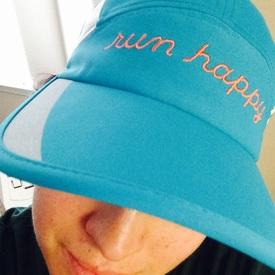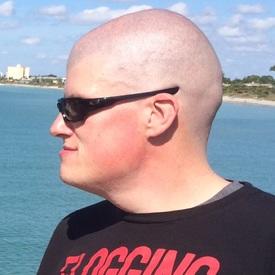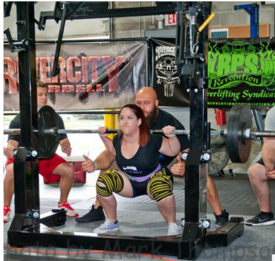Any heavy runners?
Replies
-
In for information & wisdom on this subject. I am intrigued.....very intrigued.0
-
I became a runner when I was 44 after losing 90 pounds. When I started losing weight I found jogging on the treadmill was the best way to burn calories. Then a friend suggested I run outside which I never thought I could do. I did Couch to 5K and went for my first run outside. I was hooked! I was really sore when I started to run and my doctor suggested yoga. I was very reluctant but tried it and my life has never been the same. I never get sore. I was also taken by surprise on the spiritual aspect of it.
Now I run 20-30 miles a week and ran my first half marathon last year. I will warn you, it becomes addictive!
Just watch your knees, stretch and stretch. Take things SLOW! That's why I liked couch to 5K!
Good luck!0 -
I echo Thanking everyone for the advice and tips. This could almost turn into the Official Heavy Runner Thread. Witrh that in mind I have another question
Everyone talks about taking it slow. What is a reasonable pace? Right now I am walking 4-5k 3 times a week and average around 10.5 min/km. When I start introducing my run, what should I look to for pace during that run portion0 -
Hey all. So when I started running I was over 115kg.
Runkeeper is a great app for pacing. It works with android and iphones. It calls your time/distance/pace and other metrics at regular intervals. You can play tunes as you run too without issue. It records your route and distance, and works towards your exercise count on here.
Re clothing? Compression gear all the time. under armour, compress sport, 2XU, orca, zoot doesnt matter the brand, just wear it. It stops unnecessary muscle/tissue tears from all the bouncing as you run. Means you can run more often and in less discomfort.
Whatever you wear over the top of the compression gear doesnt really matter, just make sure its synthetic. Sweat and cotton gets cold, heavy and chafes. Its awful.
Pace. I started out doing dog-legs which is a mixture of run/walk. For example, 1 minute run, 1 minute walk, for 30 minutes. Over time, you may want to do 2 minutes run, 1 walk etc. I would encourage you to stick to the same route in the beginning as you'll be able to compare perceived effort levels, times, sections etc.
Once you're up to running for a while (say 5 minutes non stop), I'd offer two options: go fast as possible, or go slow. No middle ground. Going hard encourages the cardiac ability, lactate threshold and aerobic efficiency to increase rapidly. But theres no denying its tough. The pace for this is as-fast-as-you-can-for-as-long-as-you-can.
Going slow encourages the long, slow twitch muscle fibers and endurance. A good pace is one that you can maintain conversation with someone, and would be slower than the pace you'd be setting when doing the dog-leg.
For example, when I dog-legs, my running was around 6min30s/km or about 11min miles. When doing endurance, I'd be about 7-8min/kim or 14min miles. I'd get to a point where I can do a set distance (say 5k/3m?) without stopping. Then its a case of speeding up. After a year of running, I now do my set 5k route at around 5min30s / km or 9.** minute miles.
I've restricted my diet a little bit in calories (1750 rather than 2200), and am now vegan. My resting heart rate was 80+ to ~45bpm. My blood pressure was elevated, average 135/80, now its about 125/70. Cholesterol over 6.5 to 4.2.
I too recommend getting good shoes and spending the money to get some gait analysis done, and doing it regularly. As you become a better runner, your style will change, and no doubt so will the shoes you need.
Finally, always take it steady, aim to increase distances in single digit percentages and at the first sign of pain (not discomfort) stop, ice and rest.0 -
Thank you for all the great advice.
I am really struggling for shoes right now. 4 "running stores" and yet to get shoes. I at least now know I need a wide Neutral shoe, that seems hard to find as nobody seems to have them in stock.0 -
Everyone talks about taking it slow. What is a reasonable pace?Once you're up to running for a while (say 5 minutes non stop), I'd offer two options: go fast as possible, or go slow. No middle ground. Going hard encourages the cardiac ability, lactate threshold and aerobic efficiency to increase rapidly. But theres no denying its tough. The pace for this is as-fast-as-you-can-for-as-long-as-you-can.
Going slow encourages the long, slow twitch muscle fibers and endurance. A good pace is one that you can maintain conversation with someone, and would be slower than the pace you'd be setting when doing the dog-leg.
"A good pace is one that you can maintain conversation with someone."
This is great advice, but not just for until you can run 5 minutes non-stop. I would stick with this until you've been running 20+ miles per week (non-stop each run) for a while. Then, you will get more benefit from adding in faster workouts.
As far as what pace per kilometer this translates to, that's totally individual. The most efficient pace for developing aerobic capacity is around 70% of max heart rate. You can research ideas of how to determine your max. I wouldn't use a formula (like 220 minus age), but rather a method where you're actually increasing your heart rate near maximum. If you don't have a heart rate monitor, you can just stop and take your pulse periodically and you'll start to get a good idea about where this pace is. It's going to be a "conversational" pace. At first, you may pass this point with only a little running and you will have to stop and walk until your heart rate comes back down. It's counter-intuitive, but going faster will not develop your aerobic capacity faster because a smaller proportion of your energy will be provided aerobically. During this period, your muscles, joints and connective tissue will also be changing in response to the new stress you're providing. While "base-building" (for new runners) there's not really any such thing as too slow. I used to think that I had to go "as-fast-as-you-can-for-as-long-as-you-can" on every run, but I improved more quickly after I slowed down and was able to increase my total running volume because I was recovering faster from the easier efforts.
Most of the health benefits from running will come at this "easy" pace. There's no reason to run faster unless you want to be able to run faster. The faster runs that you may add in later include tempo runs (or threshold runs), interval training, and repititions (or fartleks, hill sprints, etc.). Tempo runs are going to increase your lactate threshold and are probably the first one you're going to want to add in. Personally, I would prefer to never run faster than this (as fast as you could maintain for an hour-long race). Intervals will increase your VO2 Max and could be several 5 minute runs at around your 5K pace with a few minutes of easy running in between for a total (at pace) of 8% of your weekly miles. Repetition training is the fastest (around mile pace) and is aimed at increasing your bio-mechanical efficiency, rather than any aerobic benefit, and should only be 5% of your miles.
These runs will benefit you the most after an aerobic base has been established. In other words, if your 5K is the same pace as your mile or if you can't run a mile without stopping, then these paces become a little meaningless. I would recommend sticking to an "easy" or "conversational" pace until you can run at least a 5K without stopping, but preferably a 10K. Then, you can replace one of your "easy" runs with a "comfortably hard" run of around 20 minutes (plus warm-up and cool-down) and replace another one with a "long" run that you can continue to stretch longer and longer. Don't increase how much you run every week, but more like every third week, and only a mile or few per week at a time. After you've run some races, you can start adding in intervals and reps to increase your speed (if you want to; you don't have to).0 -
A question for all the heavy runners what do you wear? I am finding Cotton gets wet to fast. I am not going the spandex route anytime soon.
I am a heavy runner. I wear a loose dri-fit or even a lightweight cotton t-shirt and thick compression shorts because I like how they feel. And nope, I don't wear baggy shorts over them.
The most important parts of my "heavy runner" wardrobe are Bodyglide and an Enell bra.0 -
I should add that I've gotten most of my information from Jack Daniels' Running Formula and that his charts don't start until around a 30-minute 5K, so that's another good indication of when you should start thinking about adding in the faster runs. At that point, your easy pace should be around 8:00 per kilometer.
(edited for clarity)0 -
I completed the C25K last summer with my husband. That was about 30 lbs ago. We were able to complete it in the 8 weeks without repeating any runs. It is amazing how quickly you can get to 30 minutes. I do strength training and other cardio throughout the week and I am able to run longer and farther than my husband who does not so I would definitely recommend the strength training.
I do not have any knee issues but in the beginning there were some aches that I had to work through. I would be really careful about the knees and maybe ask your doctor before starting the program. I do see people on the trail I run with knee braces so maybe that would work but it is not worth ruining your knees long term.0 -
Some advice and another round of questions from me.
For those considering Knee Braces please do it in consultation with a dr. or Athletic Therapist. There are so many type of knee braces out there all designed to provide different things. If you are not aware of what/why you have knee pain you could end up with a brace not designed to solve the problem your having. knees are something I have lived through.
Wife - Torn ACL, Torn MCL Fractured Tibial Plateau.
Daughter 1 - Complete Rupture of ACL and Torn Meniscus
Daughter 2 - Torn MCL, Torn ACL and just had tumor removed from Muscle on left knee
I am starting to think I need a frequent flyers card for the Orthopedic Surgeons office
Now my question.
How many pairs of shoes do you run in? A running specialty store tells me I should be resting my shoes for 24 hours to allow the Gel/Foam to come back. Does anyone do this? or was this an attempt to get me to buy 2 pairs of expensive shoes.0 -
I have 3 pairs 'on the go'. 1 trail pair for offroad/ muddy stuff that gets used may be a couple of sessions a month. One 'good' pair I keep for my club runs and races (so 3-4 times a week) and a decent pair for general training (2-3 times a week). No logic for the 2 pairs other than I won a really expensive pair that feel incredible and as much as I'd liek to wear them all teh time I know I can't afford to replace them so am making them last!0
-
I started C25k at around 375 pounds. The program worked great for me. I went from not being able to job 30 seconds to jogging an entire 5k. I've done four 5ks to date.
Random thing I learned:
- My cardio came around a lot quicker than my legs did.
- Don't worry about speed/pace. You're not racing anyone but yourself.
- Expect to hit a wall in the course. Mine was about 5 weeks in. I just couldn't seem to complete the longer runs and had to repeat the workout 4 or 5 times before I was able to do so.
- Get fitted for shoes at a running store.
Good luck with your running and have fun!0 -
Hi There,
I started C2K at 277 Lbs and got to week 6 before having to take a break with a knee injury. I never thought i would enjoy running but found that absolutely loved even when i was saw and aching.
Managed to start again this week after a break of about eight weeks going straight back in at the beginning of week 4 without any problems.
A few words of advice cut, pasted and updated from a previous post of mine ...
Some general comments
* I continue to surprise myself, the gradual build up of run/walk ratio really helps
* Beginning of week 4 was horrendous but I did it and the next one too
* I'm using the "Run 5K " ap which is tremendous and well worth the investment
* I know the AP tells me not to but if I'm feeling good at the end of a run I will do an extra set or two of run/walks
* I have taken to walking 5K on the day I don't run which really helps
* I seem to run very slowly (5.5 K/Hour) I feel at the end i will be able to run for 30 minutes rather than 5K
* My joints ache like buggery sometimes but I have a great feeling of self satisfaction
* By using this and changing my eating habits I have lost 38lb and 4" from my waist in the past 5 months, my skin and general heath have improved.
* I threw out 3 bags of clothes which no longer fit me.
.0 -
You have gotten some really great advice here! I started running about 25 lbs heavier around 2 years ago with the Fleet Feet No Boundaries Program. It's like a couch to 5K program that provides new runner support and weekly group runs with road certified coaches. I ran two 5K's with that program and then started their half marathon training. I have now run 3 half marathons and by all accounts I am still a "heavy runner".
Cotton is rotten! Make sure that you are running in synthetic clothes. Even Target has great pieces (you don't have to spend too much money here at the beginning). Don't skimp on socks. Make sure your socks aren't a cotton blend. Blisters are no joke!
Get fitted for supportive shoes! I also have inserts in my shoes as I pronate.
Start slow and enjoy the runs! It's no fun if you are panting and out of breath. I agree with conversational pace. Take a buddy and have fun!
Get out of the gym and play around with routes. Don't get bored and remember you are lapping everyone on the couch!
Run happy!!0 -
In regards to the knee stuff. I went through a lot of pain and healing time with my hip/knee/muscles after jumping from 5K to 10K then to Half Marathon in the same year. Here are some lessons learned that will hopefully help someone else NOT wind up benched for 6-9 months while things calm down!
1 - CROSS TRAINING! Do that thing! Core muscles and arm strength are super important, so don't neglect them! A strong core is the foundation point for your running. Your arms help provide momentum and will be swinging away the whole time. Tired arms and shoulders will lead to slumping and bad form which will cause other muscle groups to compensate which leads to pulls and strains.
2 - LATERAL MOVEMENT. Get out there and make sure you're doing things that move you laterally as well. Jumping jacks, side shuffles. etc. These sort of actions build up your Glute Medius. Weakness in your glute medius can cause tendons around it to work harder than they need to, this is how your injuries start. One muscle is week and another fires off in a way it's not supposed to in order to compensate.
3 - CADENCE. Take more, smaller steps instead of fewer giant ones. With every step your weight is driving down with a huge force on your foot. The longer the foot is on the ground the longer that force is pile driving down. Cut that time down! Think quick and light steps! I've read (and be told) the best cadence is 180 left/right foot strikes per minute.
4 - STRIDE. This one goes hand in hand with cadence. With a giant stride you may find that you're striking foor is reaching a bit, landing and pulling you forward. This is not what you want and can lead to injuries. The push off should be what's propelling you. Keep them smaller and lighter!
5 - THE FOAM ROLLER IS YOUR FRIEND. Seriously, BFF that bad boy. Roll out your legs post run. Feeling tight the next day? Roll 'em out again.
So know you all know what took me 2 years, lots of tears, a stride analysis and a lot of work to figure out! I used to have a huge amount of pain after running and resolved to figure out how to run without it after being benched due to injury. All the points I mentioned have been critical to keeping me running. The cross training makes such a notible difference in the ease with which I run. The lateral movement gets my glute medius all built up and keeps my IT band in check. The cadence and stride have be HUUUUUGE for me! It's hard to adjust my cadence (going from 145 working toward that 180) but I can feel the difference it makes in my running. No knee pain, no hip pain. 'Tis glorius!!! And that foam roller....>bliss<
No go out there and get it!0 -
I started running somewhere around 220 lbs. It wasn't fast, it wasn't pretty, and at first I'd only run at night so no one could see me. After a while though, I didn't care anymore.
Start slow. When you think you're running slow, slow down some more. Speed will come with time. I found that I had to be just as patient with my running as I did with my weight loss. It's a great relationship there...as the weight comes off, you'll naturally start running faster anyway.
Make sure you get fitted for shoes. I made sure that I was running in a shoe that could take the pounding of excess weight. I didn't want to buy something and then have them fall apart because it couldn't hold up to the strain.0 -
I ran when I was heavy. I lost weight. I was also riding my bike and strength training. Good shoes are important , especially if you already have knee issues.
What I have learned however, is that I do not have a runners body. I'm very curvy and tend to carry weight in my hips and legs. My gait was such that I completely ruined my knees .After I lost a lot of weight, I started running faster and longer and blew out my knee. The result ? No more running and a knee replacement on the horizon which I can stave off if I treat it kindly. I stopped running and do only strength training and cycling (indoor and outdoor).
I will tell you I'm over fifty and that kind of thing happens. But, you can lessen the effects if you treat yourself kindly before that. Push yourself but not to the breaking point. it is so not worth it.0 -
I know everyone has already said this but just thought I would say it again! I personally started C25K when I was 230lbs. It is the best thing ever! There were a few days/weeks that I repeated, but not much and before I knew it I could run!
Definately try it out!0 -
I ran when I was heavy. I lost weight. I was also riding my bike and strength training. Good shoes are important , especially if you already have knee issues.
What I have learned however, is that I do not have a runners body. I'm very curvy and tend to carry weight in my hips and legs. My gait was such that I completely ruined my knees .After I lost a lot of weight, I started running faster and longer and blew out my knee. The result ? No more running and a knee replacement on the horizon which I can stave off if I treat it kindly. I stopped running and do only strength training and cycling (indoor and outdoor).
I will tell you I'm over fifty and that kind of thing happens. But, you can lessen the effects if you treat yourself kindly before that. Push yourself but not to the breaking point. it is so not worth it.
I do think it is important to keep in mind that you're not just conditioning your lungs/heart. There are muscles, tendons, ligaments, and bones that have to get stronger as well, and these things take time. I'm not saying that the above poster did it wrong, but she has a good point. Go slow. Too much too fast leads to injury. Your lungs might be able to take it, but the rest of your body needs to get stronger as well. Especially if you have a pre-existing injury, you'll need to ramp things up even more slowly.0 -
I don't know if any of you will come back to this, but I started Day one yesterday. I took in all your advice and most of all: I went SUPER slow. But I FINISHED. It was great. I felt great. Just had to share and say thanks again!0
-
I don't know if any of you will come back to this, but I started Day one yesterday. I took in all your advice and most of all: I went SUPER slow. But I FINISHED. It was great. I felt great. Just had to share and say thanks again!
Great job! Be careful, though, running can be addictive. :drinker:0 -
So for the past 16 days I was trying to go 4km-5km of walking/running 3 times a week wearing these
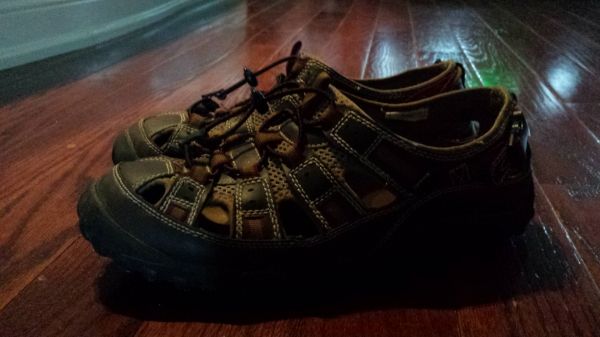
Tomorrow!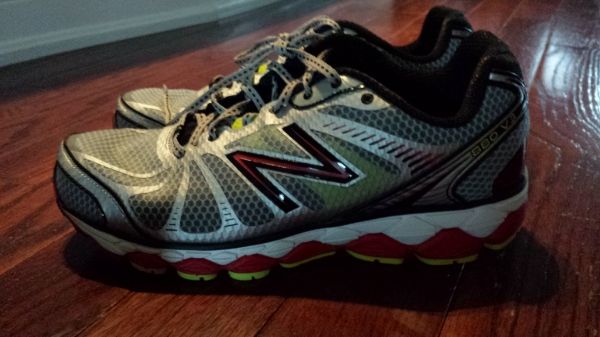
I figure these should be good for a boost of at least 30 seconds a km ;-)0 -
Well done OP - good start!
This thread is useful....Im going to try some more compression stuff for running. The compression calf sleeves I got have been a godsend!0 -
Definitely be sure to take it slow. And by slow, I mean at about 70% of max heartrate. I started running at about 235 lbs (5' 10") and made a lot of progress on speed and endurance, running my first 10k in less than 51 minutes (about an 8:15 pace). Turns out I had been pushing myself at 85+% of max heartrate, and developed compartment syndrome in both calves. My muscles had grown too fast, and the sheath around the muscles where constricting blood flow and pinching nerves. This caused painful cramps and could have led to some serious consequences.
So. Bottom line. Take it slow.
And enjoy yourself!!0 -
So for the past 16 days I was trying to go 4km-5km of walking/running 3 times a week wearing these

Tomorrow!
I figure these should be good for a boost of at least 30 seconds a km ;-)
Good luck on the shoes!0 -
Yes, I am taking it super slow. I feel like I am running slower than I'm walking, but that heart rate is up. Thanks for the advice guys!0
-
Well done OP - good start!
This thread is useful....Im going to try some more compression stuff for running. The compression calf sleeves I got have been a godsend!
Since I'm such a newbie please explain compression calf sleeves? I am trying to learn all this stuff!
ETA: Well I used google! ha and I'll keep these in mind for sure. Hopefully I won't need them.0 -
Congrats on doing your first day!0
-
I'm a little late to the party here, but I wanted to chime in with my perspective. check into the Galloway running program. If there is a group that meets near you, it is an ideal way to begin running.
I started last year at 247 lbs, and trained for my first half marathon, which I completed in March. Galloway is a run/walk program. Speed is not important in the beginning, it's about adding distance each week. As my miles went up, my speed naturally increased as well. I started off running 30 seconds, briskly walking 1 minute. My average mile time was around 14-15 min/mile. I am now down to 218 lb, and today I did a short run at 11:33/mile. I now train run 1 min, walk 1 min.
Anyway, it's a great way to get into running without injury, and I've made some great friends to run with each week.
I second the good shoes and DEFINITELY the foam roller. Short, light strides... Much easier on the knees.
Best of luck to you.0 -
This is really inspiring. I've been trying to get up the courage to start couch to 5k and this has really helped
 0
0
This discussion has been closed.
Categories
- All Categories
- 1.4M Health, Wellness and Goals
- 394.8K Introduce Yourself
- 44K Getting Started
- 260.6K Health and Weight Loss
- 176.2K Food and Nutrition
- 47.5K Recipes
- 232.7K Fitness and Exercise
- 444 Sleep, Mindfulness and Overall Wellness
- 6.5K Goal: Maintaining Weight
- 8.6K Goal: Gaining Weight and Body Building
- 153.2K Motivation and Support
- 8.2K Challenges
- 1.3K Debate Club
- 96.4K Chit-Chat
- 2.5K Fun and Games
- 4.1K MyFitnessPal Information
- 16 News and Announcements
- 1.3K Feature Suggestions and Ideas
- 2.8K MyFitnessPal Tech Support Questions






